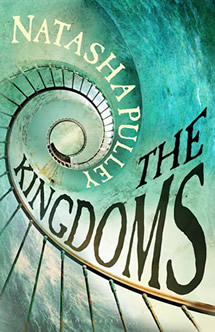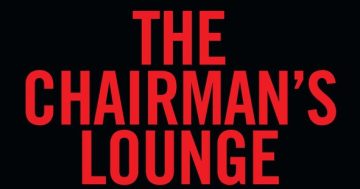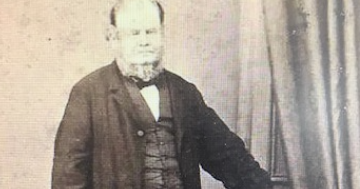Reviewed by Robert Goodman.
By Natasha Pulley, Bloomsbury.
 British fantasy author Natasha Pulley’s first three novels (The Watchmaker of Filigree Street, The Bedlam Stacks and The Lost Future of Pepperharrow) were set in the same slightly steampunk Victorian era universe. For her fourth novel she does something a little different but also stays on familiar ground. Sticking with the steampunk aesthetic, The Kingdoms is an alternate history and time travel story set in the late eighteenth and late nineteenth centuries.
British fantasy author Natasha Pulley’s first three novels (The Watchmaker of Filigree Street, The Bedlam Stacks and The Lost Future of Pepperharrow) were set in the same slightly steampunk Victorian era universe. For her fourth novel she does something a little different but also stays on familiar ground. Sticking with the steampunk aesthetic, The Kingdoms is an alternate history and time travel story set in the late eighteenth and late nineteenth centuries.
The Kingdoms opens with a man arriving Gare du Roi station in Londres in 1898. He is confused, not knowing who he is or what has happened to him but also, sure that this is not the London he remembers. After being escorted to a doctor and then an asylum he is released back to his master. It turns out that his name is Joe Tournier and he is the English slave of a local Frenchman, the French having conquered England after winning the battle of Trafalgar. Joe goes on living a life that he is sure is not his real life until he receives a postcard, sent 91 years before with a picture of a lighthouse off the coast of Scotland. His finds himself in a position to visit the lighthouse and upon doing so also finds himself back in the year 1807 having been through a gateway that allows passage backwards and forwards in time. Those who find him, an English pirate called Kite and his sister, hope that his knowledge of the future can help them turn the tide of the French invasion.
First and foremost The Kingdoms is a time travel story and time travel stories need rules. Pulley sets up early why changing the future so that he might not exist will not mean that Joe will suddenly cease to exist. But she never quite explains why, when the future changes, some people are able to sense the changes, even though this is more of a feeling than anything else. After the future has changed a few times it is probably best not to think too hard about it because the situation is so replete with paradoxes that it will make your head hurt. That said, Pulley’s premise – that modern technology and information about the future slipping back in time and captured by the French gave them the upper hand over the English in the Napoleonic wars is a fascinating counterfactual and plays out well even if the eventual resolution is a little forced.
Where The Kingdoms falls down though is in its central mystery of who is Joe Tournier and how he got that postcard. It not only becomes obvious very quickly but it is never really clear why Kite and Agatha are trying to keep the truth from him. And the final explanation, when it does come, is incredibly weak. Also, the central relationships of this book are reminiscent of the central relationships in Pulley’s last book The Lost Future of Pepperharrow, down to the marriage of convenience.
Which all makes The Kingdoms a mostly fun but often exasperating experience. Pulley is adept at pulling readers in to a fully realised slightly alternate world with characters they want to spend time with. But time travel is a tricky concept and the paradoxes and questions pile up too quickly. So while this is an always intriguing and enjoyable series of nested alternative histories it is also a bit of a head scratcher.
This and over 700 more reviews can be found on Pile by The Bed.











